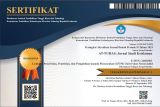Abdullah, M., Amiruddin, M. H., Dewi, E., & Mannan, N. H. A. (2025). Moderation of Thought in the Age of Radicalism : The Role of Social Media and Political Education in Countering Hate Content. 6(1), 94–110. https://doi.org/10.31538/tijie.v6i1.1373
Agama, K. (2019). Al-Qur’ān dan Terjemahannya: Edisi Penyempurnaan 2019. Jakarta: Departemen Agama RI
Ain, A. Q., & Fathurrohman, A. (2024). Penerapan Teori Mubadalah terhadap Penafsiran Ayat-Ayat Parenting dalam Tafsir Tarbawi dan Tafsir Al-Misbah. Jurnal Iman Dan Spiritualitas, 3(4), 685–692. https://doi.org/10.15575/jis.v3i4.31280
Akbar Marioni, dkk. (2011). Karakteristik Media dan Kegiatan Intergrated Marketing Communication (IMC). Jakarta: Universitas Indonesia Esa Unggul.
Al-Ghozali, M. (2005). Ihya Ulumuddin. In Journal GEEJ (Vol. 3). Beirut: Dar Al-Kotob Al-Ilmiyah.
Al-Zuḥailī, W. (2009). Tafsīr al-Munīr. In Jurnal Pikir: Studi Pendidikan dan Hukum Islam (Vol. 11). Dimashqa: Dar Al-Fikr.
Amrullah, A. M. bin A. K. (2020). Tafsir Al-Azhar. Jakarta: Pustaka Panjimas. Qurthubi 16
Andriyani, I. N. (2018). Pendidikan Anak dalam Keluarga di Era Digital. Fikrotuna, 7(1), 789–802. https://doi.org/10.32806/jf.v7i1.3184
At-Thabaristani, A. A. M. bin U. bin H. A.-Q. (1981). Mafātihu Al-Ghaib. Beirut: Dar Al-Fikr.
Azhar, A., & Gresik, M. (2024). Character Education in Indonesia Islamic Elementary Schools : A Systematic Literature Review ( 2014-2024 ). 11(1), 1–20. DOI : 10.18860/jpai.v11i1.29301
Azhari, I., Forester, B. J., Nurhayati, N., & Sirozi, M. (2025). Improving the Quality and Relevance of Education through Digital Technology-Based Planning. 11, 157–162. https://doi.org/10.19109/tadrib.v11i2
Effendi, M. N., & Mudhiah, S. (2025). Development of Islamic Akidah Education in Facing the Era of Society 5 . 0. 6(1), 77–93. https://doi.org/10.31538/tijie.v6i1.1242
Fatimah, S., Damaianti, S., Eliyati, E., Ningsih, L. S., & Gusniawati, S. (2023). Pola Asuh Orang Tua Terhadap Perkembangan Karakter Anak Mi Di Era Digital. HYPOTHESIS : Multidisciplinary Journal Of Social Sciences, 2(01), 89–96. https://doi.org/10.62668/hypothesis.v2i01.627
Fatimatuh Zahrok, Ahmad Nashiruddin, & Umar Farouq. (2023). Nilai-Nilai Pendidikan Anak Usia Dini dalam Al-Qur’an (Studi Surah Luqman Ayat 12-19) Menurut Tafsir Ibnu Katsir. Tinta Emas Jurnal Pendidikan Islam Anak Usia Dini, 2(2), 67–80. DOI: https://doi.org/10.35878/tintaemas.v1i1.931
Hanbal, A. bin. (2008). Musnad Imam Ahmad bin Hanbal (Vol. 05). Beirut: Dar Al-Kotob Al-Ilmiyah.
Islamic, I. N., & Schools, B. (2024). ISLAMIC EDUCATION BASED ON THE INTEGRATION OF RELIGIOUS CHARACTER AND ENTREPRENEURSHIP IN ISLAMIC BOARDING SCHOOLS. 5(2), 171–184. https://doi.org/10.53802/fitrah.v5i2.1084
Khotimah, H., Islam, U., Sunan, N., & Yogyakarta, K. (2022). Pendidikan Anak dalam Perspektif Al- Qur’an dan Aktualisasinya di Era Digitalisasi. 3(1), 14–35. https://doi.org/10.55380/tarbawi.v3i1.152.
Kulsum, U., & Muhid, A. (2022). Pendidikan Karakter melalui Pendidikan Agama Islam di Era Revolusi Digital. Jurnal Intelektual: Jurnal Pendidikan Dan Studi Keislaman, 12(2), 157–170. https://doi.org/10.33367/ji.v12i2.2287
Laksana, S. D. (2016). Urgensi Pendidikan Islam Dalam Perubahan Sosial Di Masyarakat. Aristo, 4(2), 47. https://doi.org/10.24269/ars.v4i2.188
Manẓūr, J. al-D. I. (1956). Lisan al-Arab (Vol. 3). Beirut: Dār Ṣādir.
Muhaimin, D. (2002). Paradigma Pendidikan Islam. Bandung: PT. Remaja Rosda Karya.
Muhammad Fariq, W., Rosyada, A., & Rahma Dhini, U. (2023). Peran Orang Tua Dalam Membentuk Karakter Anak Berdasarkan Surah Luqman Ayat 17-19; Perspektif Tafsir Al-Misbah. Al-Mau’izhoh, 5(2), 377–394. https://doi.org/10.31949/am.v5i2.7587
Munawar, S. A. H. Al. (2005). Aktualisasi Nilai-nilai Qur’ani dalam Sistem Pendidikan Islam. Ciputat: PT. Ciputat Press.
Nata, A. (2003). Manajemen Pendidikan. In Penambahan Natrium Benzoat Dan Kalium Sorbat (Antiinversi) Dan Kecepatan Pengadukan Sebagai Upaya Penghambatan Reaksi Inversi Pada Nira Tebu. Jakarta: Prenada media.
Natasya Alfany Rahmi, Debibik Nabilatul Fauziah, N. U. (2024). Analisis Nilai-Nilai Pendidikan Islam Dalam Perspektif Al-Qur’an Surat Luqman Ayat 13-19. 10(November), 957–966. DOI: https://doi.org/10.5281/zenodo.14580304
Nugrahani, F. (2014). Metode Penelitian Kualitatif Dalam Penelitian Pendidikan Bahasa. SoloCakra Books.
Nuha, U., & Astuti, N. Y. (2024). Islamic Education Overcoming Social Conflicts in Society in the 5 . 0 Era : an analysis of Nurcholish Madjid ’ s thoughts ( Cak Nur ). 11(1), 73–81. DOI : 10.18860/jpai.v11i1.28874
Qutb, S. I. H. S. (2003). Fī Ḍilālil Qur’an. In Sustainability (Switzerland). Kairo: Dar al-syaru’q.
Rambe, M. S., Waharjani, W., & Perawironegoro, D. (2023). Pentingnya Pendidikan Akhlak dalam Kehidupan Masyarakat Islam. Tadarus Tarbawy : Jurnal Kajian Islam Dan Pendidikan, 5(1), 37–48. https://doi.org/10.31000/jkip.v5i1.8533
Rofi’i, A. S. dan A. (2000). Ulumul Qur’an I. Bandung: Pustaka Setia.
Saidah, A., & Fahmi, M. (2025). The Imperative of Integrating Knowledge and Adab in Reconstructing Islamic Education in the Digital Era : A Study of Al- Attas ’ s Thought. 11(2), 123–136. DOI : 10.18860/jpai.v11i2. 32660
Salim, A. (1986). Ahlaq Islam. In Penambahan Natrium Benzoat Dan Kalium Sorbat (Antiinversi) Dan Kecepatan Pengadukan Sebagai Upaya Penghambatan Reaksi Inversi Pada Nira Tebu. Jakarta: Media dakwah.
Shihab, M. Q. (2022). Tafsir al-Misbāh. Jakarta: Lentera Hati.
Sugiarto, & Farid, A. (2023). Literasi Digital Sebagai Jalan Penguatan Pendidikan Karakter Di Era Society 5.0. Cetta: Jurnal Ilmu Pendidikan, 6(3), 580–597. https://doi.org/10.37329/cetta.v6i3.2603
Syamsudin, S. (2020). Pendekatan Ma’nā Cūm Maghzā atas al-Qur’ān dan Hadis: Menjawab problematika sosial keagamaan di era kontemporer. Bantul: Lembaga lading kata.
Syarifuddin, A. (2008). Ushul Fiqh. Jakarta: Kencana.
Talibo, I. (2025). Islamic Religious Education as a Means of Fostering Moderate Religious Attitudes in Vocational High School Students. 6(2), 527–536. https://doi.org/10.31538/tijie.v6i2.1638
 (UIN Sunan Kalijaga Yogyakarta)
(UIN Sunan Kalijaga Yogyakarta) 




.png)






